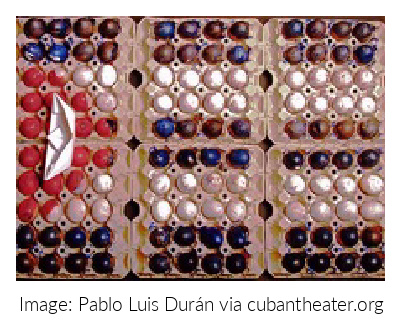Theatre, Performance, Revolution (volume)
Volume editors: Logan Connors (University of Miami), Lillian Manzor (University of Miami), Emily Sahakian (University of Georgia)
Call for Papers PDF
Theatre, Performance, Revolution (title is provisional) will explore the relationship between theatre and revolution, in and across historical, cultural, and performance contexts. Essays may address: 1) theatre and performance in times of revolution or political upheaval, or 2) theatre or performance as a site for remembering, transmitting, and repurposing histories and legacies of revolution. After several fruitful workshops over the past few years (ASTR online 2020; ASTR San Diego 2021; Lyon online 2021), and to reach an even broader array of potential authors, the editors are issuing this public call for papers. Participants in any of the workshops related to this project are particularly encouraged to submit a proposal to the volume.
Theatre and performance in times of and surrounding revolution offer productive case studies for studying the relationship between performance and historical events. These “revolutions” may have profoundly marked collective memory and/or been selectively forgotten; may have been perceived as “revolutionary” as they unfolded and/or dismissed or overlooked (despite the political changes they brought about); may have or have not been included in archives of revolutionary discourses and experiences. Revolution also invites us to consider modes of temporality and relationships between past, present, and future that challenge linear notions of time and/or disrupt theories of performance as repetition, for example: nostalgia for a revolution that has passed (with or without delivering in full its utopian values), corrosion/corruption of revolutionary ideals over time, or anticipation of a future revolution to come. Spatially, revolution evokes new places and spaces for theatre and performance, as well as appropriations and interdictions of performance places and spaces deemed “pre-revolutionary.” And performances often provide a unique space for revolutionary ideologies to unfold in front of supporters, enemies, and/or new recruits.
The geographical and temporal scope of the volume is purposefully broad. We seek concisely argued essays on theatre and performance in times of and remembering revolution from antiquity to the present and throughout the world. Participants in our workshops have discussed theatre, performance, and revolutions in France, Russia, Cuba, Venezuela, (ancient) Greece, Iran, the Czech Republic, Haiti, Mexico, the United States, Peru, China, and more. We seek essays that engage revolution as historical processes expressed, carried forth, and transmitted through performance or as an organizing principle for theatre and performance studies, rather than essays about metaphorical or institutional revolutions in the theatre world or in performance (such as revolutions in acting techniques, theatre technology, or performance theories). Essays selected for this volume will help readers better understand the strategies, tensions, anxieties, and methods of revolution-making (and remaking) through examples from a specific revolution’s theatre and/or performance cultures.
The volume includes three categories of inquiry concerning theatre, performance, and revolution:
- Archiving Performances and Performing Revolutionary Archives
- What is the archive of theatre in times of and surrounding revolution?
- Do revolutions produce shared dramatic/performatic vocabularies, processes, and/or experiences?
- Do revolutions create new archives? Do they reinvigorate past ways of knowing or introduce new ones?
- How do theatre and performance transmit, forget, and repurpose memories and legacies of revolutions? What are the specific repertoires of revolutions?
- How do we access today and how do we translate the bodies, sounds, and movements of past and present revolutions?
- Ruptures and Repetitions of Revolutionary Time
- How do theatre and performance in times of and surrounding revolution enact repetition and/or rupture?
- Do we find repetitions across movements that are often pitched as cataclysmic breaks?
- How are revolutionary performance cultures indebted to those of previous political moments?
- How are revolutionary performance cultures connected across large swaths of time?
- What is revolutionary time (the past, the present, the future) in performance? Compared to, for example, less turbulent political moments?
- Places and Spaces of Revolutionary Performance
- Where do performances in times of revolution take place?
- What spaces and places are denigrated or denied in revolutionary performances?
- Do revolutions inspire alternative performance spaces and/or locales?
- Do theatre’s material realities interrupt/disrupt a revolution’s utopian ideals and promises?
- How is space appropriated by revolutionary performances?
Authors are invited to submit 300 to 500-word proposals describing their case study and detailing how their submissions will fit into one or more of these categories. Essays will be selected based on the quality of the submission and with the goal of ensuring the volume’s geographical and temporal breadth. Final essays should be limited to 6,000 words, including footnotes/endnotes but not including translations of original text into English (the final volume will be published in English). The volume will be published by a reputable academic press and all published essays will be submitted to several stages of peer review.
Proposals are due no later than April 1, 2023. Final essays are due on November 15, 2023.
Please send proposals and all inquiries to the volume’s editors:
Logan Connors: logan.connors@miami.edu
Lillian Manzor: lmanzor@miami.edu
Emily Sahakian: sahakian@uga.edu





